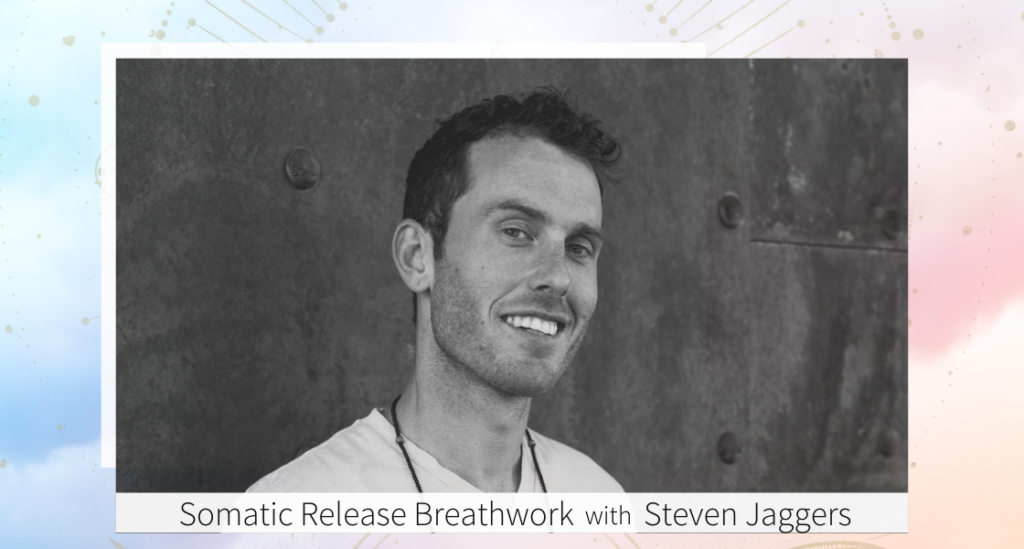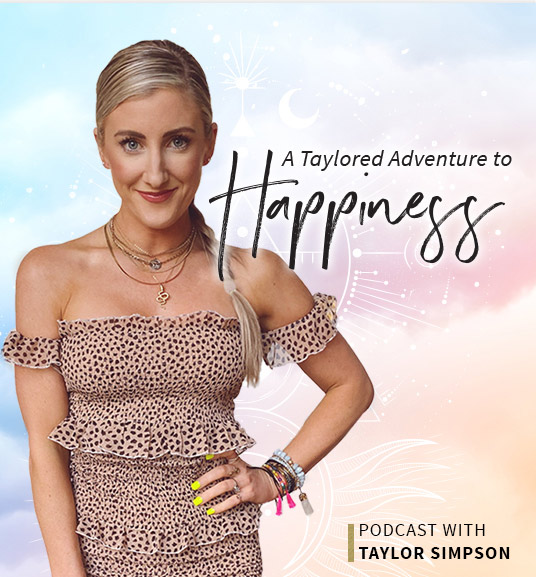[fusebox_track_player url=”https://taylorsimpson.com/wp-content/uploads/2021/07/ATA_-EP285_Somatic-Release-Breathwork-with-Steven-Jaggers.mp3″ image=”https://tsimpson12.wpengine.com/wp-content/uploads/2020/05/podcast-photo.jpg” artist=”Taylor Simpson” title=”Somatic Release Breathwork with Steven Jaggers : Episode 285″]
Hi sister! Welcome back to another episode of a Taylored Adventure to Happiness. If you are new, welcome! If you are a regular, you know I love you!
Today, I’m super excited because we have a juicy scoop episode full of insights into deep healing, self-discovery, and trauma resolution. We’ve all had some kind of trauma in our lives. But when we hear the word “trauma,” we often think of it as a negative thing. Yet, our wounding is often the gateway to our deepest wisdom and our most profound connection to source. But that doesn’t happen automatically.
The way I see it, we have a choice: we can find ways to lean into our wounds — often with the help of a professional — and learn to transmute what we find into light. Or we can mask it, avoid it, bury it, or project it onto others. That’s where people get into trouble. Then the wound doesn’t become a connection to source, but another burden in the backpack of shit we carry around day to day.
I’m blessed to have so many inspiring healers and leaders on this show, and this episode was no different. Stephen Jaggers joined me for an illuminating discussion about our body’s wisdom and our capacity to resource ourselves with exactly what we need.
Stephen has created a unique modality called Somatic Release Breathwork, combining body-based wisdom, breath techniques, and trauma theory. He shared what led him to pursue healing, his experiences with psychedelics, and what shaped the formation of his technique, including his own traumatic childhood. Finally, Stephen serves as an example of how we can manifest well-being no matter where we come from and help others who face difficult life experiences. Let’s get started!
A Bit About Stephen Jaggers
As the creator of Somatic Release Breathwork, Stephen is a powerful healer and thought leader in the field of integrative medicine. His technique clears suppressed emotions, creates optimal conditions in the body for it to release long-held traumatic memories, and makes space for clients to step into their most powerful selves.
His healing journey took him down many exciting paths on the way to creating this modality. He studied psychology and physical therapy before switching to bodywork via a holistic healing college. After working in this space, he deepened his study through plant medicine and became involved in the groundbreaking research institute Multidisciplinary Study for Psychedelic Studies. After a life-changing experience with Holotropic Breathwork, Stephen realized that breathwork was his calling and began to incorporate it into his bodywork with great success.
In addition to providing treatments using his modality, Stephen teaches and certifies new practitioners. As a neuromuscular therapist and human optimization coach, Stephen has a multitude of offerings to help his clients break free of limiting life conditions rooted in traumatic experiences.
What is trauma?
Stephen is a true warrior who was initiated into his work through a difficult childhood. Like many of us lightworkers, his early life had plenty of challenges.
“I had a deep knowing when I came into the world that … there was something not right with my family. And you know, you look up to your parents as gods when you are young. And there was a striving for me to want to help them. … They did the best that they could, and I still had a very good childhood and everything, but they were significant drug addicts, and I could tell that they were hurting inside. “ – Stephen Jaggers
I was happy to hear that Stephen agrees with my belief that we choose our parents before we incarnate. When you’ve lived the kind of life that he has and risen above your challenges, having this understanding just comes easily. Many, many old souls come here to break lineages of pain, abuse, and destruction. It’s not an easy achievement, but when we commit to doing it, we are doing true ancestral healing.
At the same time, no one can downplay the damaging effects of trauma on our minds, bodies, emotions, and spirits. While some break patterns of abuse passed down for generations, many perpetuate this cycle. They might choose a path of drug addiction, disempowering relationship dynamics, scarcity issues, and an overall fear-based approach to life. Many take out their unconscious pain on themselves or others, end up with ailments and disease, and live well below their highest potential.
So what is trauma anyway? Stephen shared:
“Trauma is pretty synonymous with stress itself. … We can think of trauma as a specific incident [while] stress can be [the] little things … [But] trauma is not the actual event. [It’s not the] the thing that that happened to you, trauma is what happens inside of you based on the thing that happens to you. So what happens inside of you is … a trauma response. [That response is] the defense systems that come up.” – Stephen Jaggers
The important thing to understand about trauma responses is that they come from your body’s innate intelligence. They are not a malfunction or something going wrong in your body; they’rehighly effective ways that your being (mind, body, emotions, and spirit) protect you from inescapable pain. Stephen talked about one well-known and common response, disassociation:
“If somebody was sexually abused as a child … a piece of them … leaves during that [experience]. Their consciousness leaves because they … don’t want to be there to fully experience it. … That is the innate intelligence of the body, but that doesn’t mean that it [just goes] away. So you could see later on in life, like 10 or 20 years later … [when this] person is trying to be intimate with their partner. And that same pattern is going on, where they’re leaving [their body] when they’re trying to be present with their partner intimately.” – Stephen Jaggers
While that’s one trauma response, there are many others related to a mechanism you might already be familiar with: fight-or-flight. So, being aggressive and arguing to protect one’s self from an abusive parent might manifest later in life as anger issues. Fleeing a scary situation as a teenager might manifest later as being dissociated or staying super busy to avoid feeling anything. There is also a freeze response, which may cause a person to have chronic tension in their muscles and entire body.
Sisters, we don’t have to have experienced something horrible like abuse to have these responses. Just walking around day to day can cause chronic stress, which, as Stephen said, is a low-grade trauma. How many of us feel closed off and tight after being catcalled or walking home at night? Stephen emphasized that since trauma is what happens inside your body, not the event itself, something that might traumatize one person might not traumatize the other. So don’t downplay anyone’s experiences, including your own.
How is trauma stored in the body?
How many times have you had an insight into a dysfunctional pattern you have, only to revert to the old pattern despite your awareness? How many times have you done psychological work to uncover why you’re doing something, and even done significant emotional processing around it, only to have it come up yet again?
According to somatic practitioners like Stephen, it’s because the trauma response stays in your body. What that means is that when your body releases fight or flight “survival energy” and is not given an outlet for it, this charge lingers in your physiology. So, your nervous system might be stuck on “on” or “off”, keeping you either extra alert to danger, or numb. Our bodies store memories, so when something or someone triggers you, your body might react before your mind can catch up. Stephen shared that he has seen many clients who have gotten to great places mentally but can still get triggered, to the point where they explode at their partner or their friends.
So why does trauma get “stored” in the first place? Why doesn’t it get released?
“When something traumatic happens to an animal in nature, the first thing they do is start taking deep breaths and [shaking] their body uncontrollably … That’s a somatic discharge that sends a signal to the brain saying, okay, this trauma is over. I can now relax. … [Whereas] we walk around with these things happening, and we’re like,’ I’m just going to hold it all together for my children, for my family, for my business. I’m tough … I can carry it all’ … And our bodies [are] almost like memory cards in a way. The body keeps the score, it remembers everything.” – Stephen Jaggers
Wow, that’s powerful. As humans, we don’t necessarily know how to discharge trauma from our bodies in the moment. If it happened when we were kids, we definitely didn’t know. If it happens as adults, we power through because we need to. We can’t go back to the past, but we can heal our bodies now.
Just like our subconscious mind, our physical vessels track and remember everything that happens. So you might be wired to react a certain way, feel a certain way, or behave a certain way based on things that remind your body of a past experience. The body has been the missing piece in psychology. But thanks to Stephen and many other somatic practitioners, we’re reclaiming this space.
So how does carrying trauma in our bodies affect us? I always use the metaphor of a backpack. How much might this be weighing down your backpack? A lot, it turns out:
“There’s a term called parasitic tension. And a lot of the times when we have undergone trauma, we have this sort of parasitic tension in our body [and] we don’t even know it’s there, but our musculature is contracted. … We’re closing off our heart. Our hips are tight, you know … from protecting down there. So that starts to drain on our energy system [and] on our nervous system. And we don’t even know [it’s] going on, but it’s draining us and it’s draining our capacity to let new experiences in and to actually put energy towards the thing that we want to do in this lifetime” – Stephen Jaggers
That’s insane right? Can you imagine what it would be like to be free of this type of weight? How much higher can you raise your vibes? How much freer would you literally be with your body able to move more freely, your mind thinking more clearly, and your emotions more stable? I’m so grateful Stephen is doing this amazing work because it’s so needed.
“As humans, we’re animals first, and we are thinkers second. We are bodies first … our mind [is] second. … First, we [have an] instinct, then we have emotions, and only lastly do we think. And the thinking part of us is the storyteller. … And if we are instinctually hurt and emotionally hurt, it’s going to skew our stories. It’s going to skew our mind towards darkness, towards creating negative stories about ourselves … [in a] self-defeating prophecy. … When we start to … help people discharge a lot of the stuff that they’ve been holding onto physically in their body … [and in] their emotional body, then their stories about themselves [and] their stories about the world start to change and start to skew more towards light” – Stephen Jaggers
That’s some powerful stuff. So now that we know we need to put our bodies first when it comes to healing, let’s look at how to do that.
Using the breath to release trauma
Stephen was first introduced to breathwork through a session with Stanislov Grof, the creator of Holotropic Breathwork. Stephen shared that he’d already had profound experiences with psychedelics, so he was skeptical going in. But he was blown away:
“It was one of the most profound healing experiences of my life. … I had significant releases from [the stuff that I’d been carrying my whole life.]” – Stephen Jaggers
This modality uses conscious deep breathing that creates a hypnotic, relaxed state and often produces psychedelic visions, deep insights, emotional healing and physical releases. Stephen shared that participants usually do a session in groups, where they’ll lay down with cozy blankets and pillows, listening to music, and being guided by a facilitator to breathe in a specific way for a sustained period of time, such as 40 minutes. Participants may feel where their body is resisting the breath followed by a release. Some will cry or get emotional; others may laugh, scream, feel pleasure, and even feel sensual sensations. An integration period follows the session, where people will share what they experience and express it through drawing, painting, or creating mandalas.
It turns out that the deeply rooted trauma takes up a lot of space, as Stephen described a huge difference after the release.
“When you clear out a lot of the [trauma], you actually become pretty clear mentally. I had some profound insights … without any other substances besides my own breath, my own inspiration, if you will.” – Stephen Jaggers
That’s amazing. All you need is you. All you need is your own breath. You can use tools—sometimes the tools are great! But it’s amazing that you can have visions, insights, and most importantly, powerful healing that comes only from you.
It didn’t just work for Stephen either. He describes other people in his workshops receiving the same amazing releases. They were having profound releases, insights, and clarity all with the breath. Stephen was hooked. He never looked back, and now he considers breath to be one of the biggest indicators of a person’s mental, emotional, physical, and spiritual states.
“The breath is the number one thing to watch [when gauging someone’s] nervous system state. When I’m working on somebody … [I’ll ask myself if] ‘Are they holding their breath? What is the quality of their breath?’ – Stephen Jaggers
Somatic Release Breathwork
Breath techniques are practiced all across the world by vastly different cultures. There are breathwork techniques from the indigenous Maya, from African bushmen, and let’s not forget from India, where yogic breath techniques are well known. But it’s only in recent years that modern breathwork has been adapted and used in the West for healing purposes.
Stephen shared that there are many different types out there, and they all have a similar goal: to facilitate states of non-ordinary consciousness, and trigger deep healing and insight. The difference lies in the technique. Some have a faster versus a slower pacing; some incorporate rattles, drums or other instruments; some are meant to be done for short periods and more frequently.
Stephen has created an amazing technique that incorporates some of the most powerful healing techniques we have today, which just happen to be his passions: breathwork, Neurolinguistic Programming, and two different types of breathwork, which he describes as “holotropic style.” The result is that he is able to gently yet effectively guide clients into altered states from which they can safely release their stuck survival energy. He describes how his breath technique affects people.
“Your body is actually going into a trauma state … which opens up this portal and allows you access to discharge and express whatever you’ve been holding onto [since] when that actual trauma happened.” – Stephen Jaggers
Stephen has also used his personal experiences in doing multiple types of breathwork in different settings to tweak his approach.
“I’ve gone to breathwork [sessions] where the whole thing [just involved] clearing and [a lot of] people … didn’t know who they [were] after that. … A lot of our ego and our identities are deeply embedded within trauma and what we’ve gone through. So after clearing stuff out, I’ll slow it down and take their nervous system from a heightened state into a relaxed state and actually have people breathe in what they want to embody in the world. How do they want to show up? [I tell them to] see it clearly, feel it in every one of [their] cells, feel it as if it’s already happening … and have that radiate from within their being while they’re seeing it.” – Stephen Jaggers
So calling in the new is key. What would your new be? If you had the chance to release all that baggage, all that pain, what would you want to replace it with? It’s not an easy question if you’ve identified with your victim story for a long time. So start thinking about it now.
“A lot of the time, people’s deepest places where they’ve been wounded is the place where they can bring the most gold into the world. It’s the place where they find their deepest purpose. We all want to feel like we are contributing to our tribe, contributing to our community. The experiences that we’ve overcome [allow us to] help others in the same position.” – Stephen Jaggers
Wow, that is profound. What an incredible inspiration and light he is sharing with us. Go listen to the podcast for more insights into Stephen’s fascinating technique — it’s so fucking worth it.
Do you think Stephen’s technique might help you? Feel free to schedule a zoom session with him on his website. Check out his workshop and retreat schedule, and if you’re a therapist, coach, bodyworker, chiropractor, or other healer, find out how you can train and get certified to practice Stephen’s technique.
If this message hits home for you, don’t hesitate to let us know! You can tag Stephen, @jaggersjr, and me, @iamtaylorsimpson, on Instagram with a screenshot of the episode and your greatest takeaways!
Remember, I love you. I see you. Cheers to freeing yourself from your past and moving forward. And remember: Always choose happiness because, well, why the fuck not?

Text the word JOURNAL to 202-217-0704 to receive journal prompts & to connect 1:1 with me!! YES, that’s my # and it’s ME!
What’s Your Money Frequency? Find Out Now
Come say hi over on Instagram
In Today’s Episode You Will Learn:
- What does abundance mean to Steven
- How having drug addicts as parents led Steven to his greater mission and what it is
- The massive shift incorporating breathwork into your daily practice can make in your life
- What is trauma and why your body stores it
- How are trauma and growth connected
- The physical stuff that happens to you when you experience trauma
- Beginner tips to start releasing sexual trauma
- Different types of breathwork and what happens in your body with each of them
- Some ways you can start your breathwork practice at home
- The power of your body vs introducing plant medicine, bowls and instruments
- Ways to integrate the work rather than bypassing it
- What internal dialogue is Steven expanding on right now
- How to shift out of the doing and into the being
- The things you get to experience before you get to ascend
- Navigating through the different aligned seasons of your body





